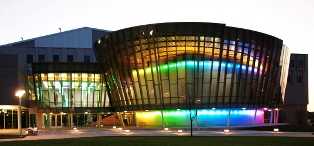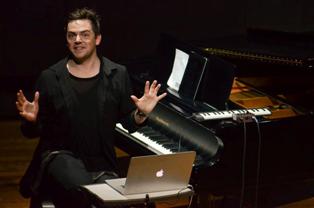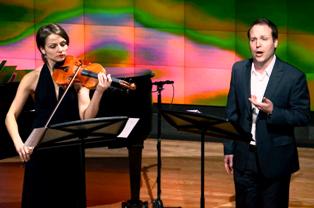
Nico Muhly Meets the Digitorium

(first published in The Cincinnati Enquirer Oct. 12, 2012)

Nico Muhly, 31, has been called “the hottest composer on the planet” -- and not without reason. To say that he is on the cutting edge of musical composition is no exaggeration, as a rapt crowd learned Tuesday evening (Oct. 9) in the Digitorium in Northern Kentucky University's Griffin Hall.
Composer-in-residence for the 2012 Constella Festival of Music and Fine Arts, Muhly hosted, explained and performed over an hour’s worth of mind-bending, electronically-laced musical art. Working with him was visual and electronics artist Jordan Munson, who filled the 285 micro tiles on the wall of the Digitorium with light, color and abstract imagery.
The music was all-Muhly, including a world premiere, Three Songs for tenor and violin, featuring tenor Grant Knox and violinist/Constella artistic director Tatiana Berman. Also on the program were “Keep in Touch” with Joanne Wojtowicz on amplified viola, a set of pieces with Muhly at the piano, and a choral work, “Like as the Hart,” performed by the NKU Chamber Choir conducted by Randy Pennington.
Centerpiece of the program was Three Songs, a setting
of surrealist love poems by Andre Breton ("Always for the First Time") and Jacques-Bernard Brunius (“I Love"), separated by a song-without-words for solo violin. Opening electronically on a soft, stark interval (Muhly manipulated the electronic elements throughout the concert), it transpired
as a dialogue between Knox and Berman over drones. Breton's poem was drenched in longing. Brunius' was upbeat and hopeful. The solo violin's dramatic, sorrow-filled song was insightfully and beautifully rendered by Berman. Lines from the poems were interspersed with
Munson’s atmospheric projections, which keenly reflected Knox’s heartfelt vocalism.

Wojtowicz “plugged in” her viola for “Keep in Touch,” which Muhly introduced in droll, viola-joke fashion: “What could I possibly do with a viola?” Quite a lot, actually. Muhly describes it as a lament, cast loosely in the form of a chaconne (a baroque form based on a repeated cycle of chords). The electronic element consisted of a pre-recorded CD, featuring vocalist Antony Hegarty (of Antony and the Johnsons) whose androgynous sound is intended to reflect the viola’s position as the “in between” voice of the violin family. It was a fascinating work, with percussive, even violent effects, as well as ecstatic ones, ambiguous faces on the Digitorium wall and Muhly ever-busy coordinating the electronics on his laptop computer.
The concert opened with “The Adulteress,” a setting of the biblical text about Jesus and the woman taken in adultery. It was the most traditional work on the program (no electronics), essentially an opera scene, given a touching rendition by soprano Samantha Stein and pianist Rosemary Ritter, with projections of blues and reds that became suffused with light at the end.
Muhly took to the piano for “Skip Town,” a rhythmically charged work with pre-recorded percussive effects, providing a sudden, brief splash of fun. He followed with “A Hudson Cycle,” a tribute to a pair of departing friends and “the saddest piece I’ve ever written,” he said. Beautiful colors were projected here, reflecting the minor-mode harmony of the work. Muhly closed the set with “Drones and Piano.” His objective here, he said, was to array sounds that surround us in daily life over a drone (in this case two notes repeated throughout). There were scratching strings, bell and organ-like sounds and some dramatic acoustic piano, requiring Muhly to address the piano with one hand and the keyboard interacting with his computer with the other.
Final work of the evening was “Like as the Hart,” inspired by Psalm 42. Violinist Elizabeth Steva and percussionist Joe Bedel performed the acoustically conceived work with 30-voice NKU Choir, who unfolded the text with slowly changing harmonies, placing the central emphasis on the word “God.” Complementing the voices were soft touches of gong, triangle and wood block and melodic fragments and figurations on the violin.
The concert was followed by a reception and art exhibit by Andrey Kozakov in the lobby of the Digitorium. The Constella Festival continues at 8 p.m. tonight in Patricia Corbett Theater at the University of Cincinnati College-Conservatory with the Café MoMus Contemporary Music Ensemble performing more Muhly. Admission is free.